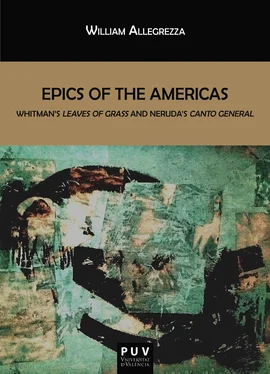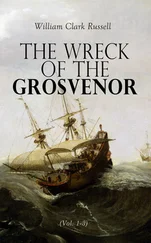William Allegrezza - Epics of the Americas
Здесь есть возможность читать онлайн «William Allegrezza - Epics of the Americas» — ознакомительный отрывок электронной книги совершенно бесплатно, а после прочтения отрывка купить полную версию. В некоторых случаях можно слушать аудио, скачать через торрент в формате fb2 и присутствует краткое содержание. Жанр: unrecognised, на английском языке. Описание произведения, (предисловие) а так же отзывы посетителей доступны на портале библиотеки ЛибКат.
- Название:Epics of the Americas
- Автор:
- Жанр:
- Год:неизвестен
- ISBN:нет данных
- Рейтинг книги:3 / 5. Голосов: 1
-
Избранное:Добавить в избранное
- Отзывы:
-
Ваша оценка:
- 60
- 1
- 2
- 3
- 4
- 5
Epics of the Americas: краткое содержание, описание и аннотация
Предлагаем к чтению аннотацию, описание, краткое содержание или предисловие (зависит от того, что написал сам автор книги «Epics of the Americas»). Если вы не нашли необходимую информацию о книге — напишите в комментариях, мы постараемся отыскать её.
Epics of the Americas — читать онлайн ознакомительный отрывок
Ниже представлен текст книги, разбитый по страницам. Система сохранения места последней прочитанной страницы, позволяет с удобством читать онлайн бесплатно книгу «Epics of the Americas», без необходимости каждый раз заново искать на чём Вы остановились. Поставьте закладку, и сможете в любой момент перейти на страницу, на которой закончили чтение.
Интервал:
Закладка:
Some features of Latin and Anglo American literature stem from these differences. For example, Latin American writers tend to focus on the collective more than the individual; this can be seen in works like Cien años de soledad ( One Hundred Years of Solitude ) and Ficciones ( Fictions ). 20 In Anglo America the individual is raised to the position of hero: Ishmael, Hester Pyrnne, and Huck Finn. In other words, people are privileged over the individual in Latin American writing, while the reverse is true in Anglo America. Another difference between Latin and Anglo America that stems from centralization is the position of the writer in relation to society. It is practically a truism in North American criticism to state that a writer has little effect on society; popular images portray writers as nonconformists in search of original art; moreover, Anglo American writers have a tendency to avoid political matters. Stemming from the nineteenth century, Latin American writers often take up the position of political reformers; this stance is especially true of Chilean writers—Jean Franco suggests that it descends from Chilean poets’ working-class backgrounds (264). Latin American writers often assume the position of being the conscience of society; their positions as more valuable to society aids in this perception. Also, there is a difference between textuality and immanence in Latin and Anglo America. Roberto González Echevarría argues that Latin America is grounded in texts (“Latin America” 52). With the colonization of Latin America, European styled universities descended from Medieval scholasticism were set up. This helped foster a sense of an educational and textual grounding. In other words, Latin Americans were educated through texts already present. Due to this textual education, Latin American writers feel the sense of having a textual past in a way that Anglo American writers do not. As noted earlier, Anglo American writers stress their own experience in the present. Instead of relying on texts and understanding a textual past, Anglo American writers have been content with their own experience as precedent.
Pointing out these few differences between Anglo and Latin America helps focus the differences between Neruda and Whitman and what Neruda gained from Whitman’s Leaves of Grass . First, Whitman is more interested in the individual than Neruda; Neruda sees the individual’s place within a collective with centralized power. Second, Whitman does not focus on numerous specific instances in the past, whereas Neruda spends much of Canto general discussing past action, so much so that some critics, like Lois Zamora, view the work as focused on the past (13). Unlike many Anglo American writers, Whitman understands himself as an engaged writer in politics; Neruda understands the poet’s role as directly involved in current struggles. Lastly, while Whitman believes that American literature has not been written and that Anglo Americans are relying too much on European sources, he does not suggest that Anglo Americans are outcasts from a textual tradition. Neruda expresses a sense of isolation, as if within their inherited European tradition, Latin Americans stand to the side. 21
Before turning to Whitman, a few last points about Pablo Neruda must be made. Neruda is different from many Latin American writers because his focus is the future in Canto general . Valenzuela states that Latin American writers long for the future but are hampered by fears of the past (11). Such is not the case with Neruda. Following Whitman’s example, Neruda turns his vision towards the future. It suffices to say here that Neruda is more concerned with specific events in the past than Whitman; however, Neruda writes Canto general in an attempt to create a certain type of communist reader and to start a new literary tradition for Latin America. He hopes that his work will act as a foundational piece that will help shift Latin Americans from their fear of the past to a dream of an united future. Neruda was influenced in this hope by Whitman, so before exploring Neruda’s Canto general , the study explores Whitman’s political goals, his use of camaraderie, his vision of history, and his aesthetics of reader participation in Leaves of Grass . This structure does not suggest that Neruda was a lesser poet than Whitman or that he took Whitman’s start and made a work that functioned better. This structure echoes a basic premise of this study, which is that Whitman and Neruda are poets who are equal in founding the literary cultures of their countries. In exploring their works together, the study can explore how Neruda uses Whitman’s work as a paradigm to start a literary culture just as rich as that Whitman started in Anglo America but ultimately different. In essence, the study does not argue that Anglo and Latin American literature are branches from the stem of Whitman’s work; rather, it suggests that while similar they are distinct, but that in looking at their founding moments, the distinctions and similarities are highlighted.
1 Gwen Kirkpatrick argues that Canto general is the epic work which sets the ground for all later Latin American poetry (“Dos poemas” 160).
2 My use of lyric-epic comes from James Miller’s America’s Lyric-Epic of Self and Democracy . See page 25.
3 Translation by Barabara Huntley and Pilar Liria.
4 Simón Bolivar wanted to tie Latin America into one republic. José Enrique Rodó in Ariel made an influential call for Latin American unity. Politically, at many moments in Latin American history motivation existed to foster a composite Latin America, as events like the Pan-American Congress in 1906 show.
5 The English and French Canadian tradition of the epic is the least pronounced on the continent, although some critics, like James Johnson, have chosen to discuss works by E.J. Pratt and Louis Fréchette as epics.
6 Other writers, such as the members of “Young America,” including Nathaniel Hawthorne and Edgar Allen Poe, discuss the idea of an American poet. Also, for a good examination of Whitman fulfilling Tocqueville’s ideas see H. Keith Monroe’s “Tocqueville, Whitman and the Poetry of Democracy.”
7 See Pearce’s The Continuity of American Poetry , Miller’s The American Quest for a Supreme Fiction: Whitman’s Legacy in the Personal Epic , and Walker’s Bardic Ethos and the American Epic Poem for discussions of Whitman as the founding writer of the American epic.
8 Bakhtin’s suggestion is that any national work of contemporary relevance will now be written in the novel, and many critics agree, arguing that works like Moby Dick, Beloved , and Cien Años de Soledad ( One Hundred Years of Solitude ) are epic works. As early as Fielding novelists were considering themselves as inheritors of the epic tradition, and in a way, they are, for the traditional epic is difficult to produce, if not invalid in the New World. Admittedly, a study could be written on the dual inheritance, poetic and prose, of the epic in the Americas.
9 See the sections Inscriptions and Songs at Parting .
10 See Miller page 75. Miller assumes there are three major parts of Leaves of Grass which are surrounded by introductory and concluding poems.
11 From the time of the Monroe Doctrine to the present day, critics from both outside and inside the U.S. have complained of the insular nature of American concerns.
12 Whitman or Neruda did not want to create entirely new languages – both were comfortable with English and Spanish; rather, both intended to create a new way of using language. In other words, both writers believe that language structures actions so that to change action you can change language.
Читать дальшеИнтервал:
Закладка:
Похожие книги на «Epics of the Americas»
Представляем Вашему вниманию похожие книги на «Epics of the Americas» списком для выбора. Мы отобрали схожую по названию и смыслу литературу в надежде предоставить читателям больше вариантов отыскать новые, интересные, ещё непрочитанные произведения.
Обсуждение, отзывы о книге «Epics of the Americas» и просто собственные мнения читателей. Оставьте ваши комментарии, напишите, что Вы думаете о произведении, его смысле или главных героях. Укажите что конкретно понравилось, а что нет, и почему Вы так считаете.












